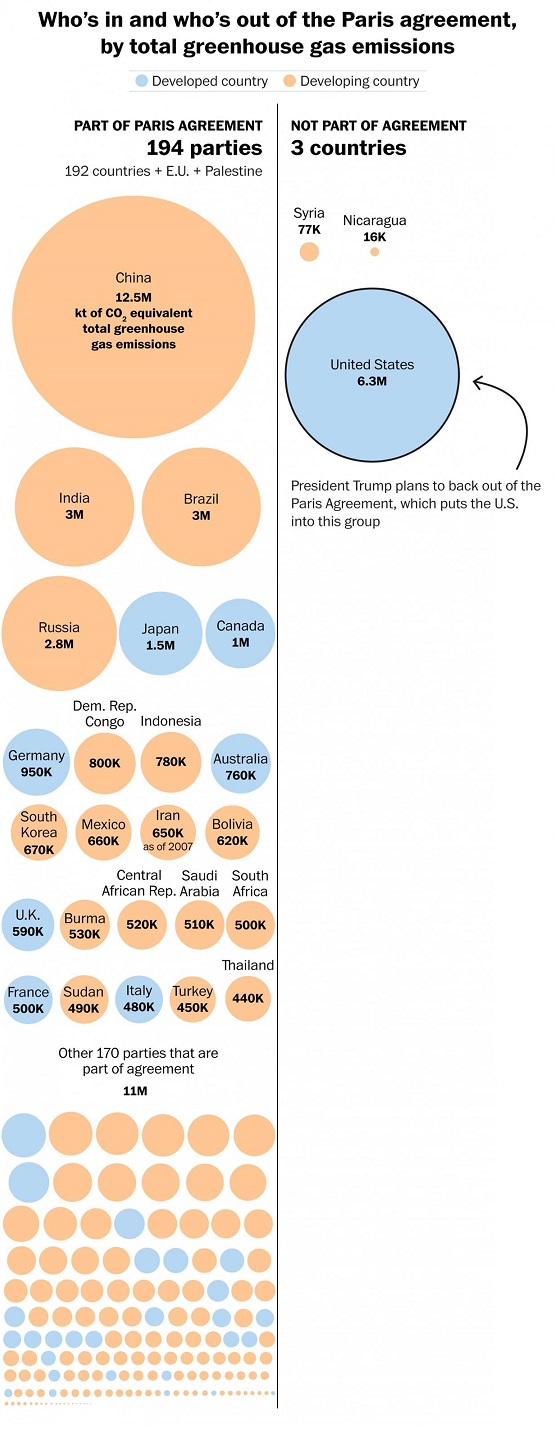Leaving the Paris Pact Puts America Last

I almost waited to write this up until the decision was final. But given the deeply troubling reports from last week’s G7 summit, and multiple reports today that 45 indeed plans to follow through on his campaign promise to pull out of the agreement, this can’t wait. Let’s not pretend we don’t know what’s coming.
Nothing but hyperbole will do. There simply aren’t words for the vastitude of this error in judgment. Ignorance, left unchecked, is poison. Socrates called it “the only evil.” D’Holbach averred that man’s ignorance of Nature “appears to doom him to continual error.” Asimov warned of the “cult of ignorance” that was already manifest in the politics and culture of his time. Neil Postman worried in 1985 that “we are losing our sense of what it means to be well informed.” And Carl Sagan cautioned endlessly of the “combustible mixture of ignorance and power” that threaten civilized democracy. In light of this week’s news, we can see the long crawl toward idiocy approaching a cresting point.
The Trump administration’s reckless and painfully short-sighted decision to walk away from the Paris agreement is bad economics, bad foreign policy, and bad for the planet. It goes against the advice of climate experts, leading economists, industrialists and business executives from around the world. It damages our international standing and weakens our leverage in future negotiations with foreign leaders. It erases any incentive that standing by our commitments otherwise would have carried for phasing out exorbitant fossil fuel subsidies. It is utterly unresponsive to current market forces, which continue to trend away from carbonaceous fuels and towards clean energy technologies. And perhaps most serious of all, it serves as the latest indication of America’s waning relevance — a message to other world leaders that we cannot be trusted to cooperate in global economic affairs.
Such self-inflicted wounds seem difficult to square with Trump’s all-encompassing “America First” policy. Alas, given his comprehensive rollback of the federal climate initiatives enacted under Obama, the Trump doctrine appears more wedded to slowing the fiscal bleeding of fossil fuel corporations than the rise in global temperatures.
Experts have long considered global climate change a “super” wicked problem, which is to say that it requires interdependent parties at every level of development to act collectively to regulate markets and industry. That is to say further that it requires consensus building on the part of both developed and developing nations to scale back fossil fuel usage and invest decisively in clean energy production. As it is, this problem is one that has always had one solution: binding, international agreements to cut greenhouse gas emissions.
The Paris accord was an historic geopolitical success in which 195 countries put forward pledges to reduce emissions and protect our planet. Parties to the agreement set the ceiling at 2 degrees C from pre-Industrial temperatures, widely acknowledged as the upper limit for avoiding the worst effects of climate change. The lack of any sort of binding mechanism still leaves much to be desired, no doubt, but these were unequivocal steps in the right direction (albeit belated: the current NDCs hashed out at Le Bourget commit us to a warming of between 2.6 and 3.6 C by 2100 according to the latest studies). That none of the intended contributions are legally enforceable is a major pitfall of the agreement, as critics have soundly noted.
But what’s important to keep in mind is that the absence of legal teeth isn’t unique to Paris. Rather, it’s a fundamental difficulty with international agreements in general. Enforcement across state lines has always been a tricky issue, and it’s one we’re still trying to navigate. As The New York Times notes, “after the failure of the 1997 Kyoto Accord, the United Nations, which oversees climate change negotiations, decided that it simply did not have the authority to force a legally binding agreement.” The participants at that time agreed that a bottom-up, decentralized structure whereby each nation volunteers its own reduction targets, with progress checks at regular intervals, was preferable to dealing with the complexities of international law. That leaves the responsibility up to individual nations to follow through on their pledges out of little more than a sense of shared duty and moral obligation, on pain of reputational losses.
To that end, Paris is a resounding success, because it demonstrates that virtually every sovereign state extant is united in this common project. It demonstrates that decarbonizing the global economy isn’t an unreachable pipe dream, but a goal for the global community to rally behind. And that’s what makes the foreign relations angle at least as important as the economics and future planetary health. Reneging on such a critically momentous coalition as this stands to undermine global partnerships, cede leadership and soft power to other world players like China, India and the EU, and could lead to an overall loss of trust around the world.
Indeed, as the world’s largest per capita emitter, it’s all but inevitable that our withdrawal from the pact will establish the US as a pariah on the global stage and, in the worst of all possible outcomes, may induce other nations to withdraw or relax their efforts in turn. At best, this undiplomatic contretemps sets a dangerous precedent and creates significant uncertainty with respect to per-nation compliance going forward.
With this decision, the US and Syria are the only two countries not on board. Syria’s been a bit busy, granted; what’s our excuse? And even latecomer Nicaragua waited to ratify only because the agreements didn’t go far enough, not because they spurn the science.
Not only does this maneuver put us at odds with the rest of the civilized world, it flies directly in the face of our business and economic interests at home. This past January more than 630 US businesses and investors signed an open letter calling on elected leaders to pursue low-carbon policies and uphold the Paris agreement. And just last month, twenty-five Fortune 500 companies, including Microsoft, Apple, Amazon, Google, Facebook, Tesla, SpaceX, Disney, GE, and hell, even Shell, submitted full-page advertisements in The Wall Street Journal, New York Post, and The New York Times, urging Trump against backing out. The administration’s departure from the agreement is a giant middle finger to corporate America and job creators, the very communities he promised to champion during his campaign.
All is not lost, however. Coal is on the outs, and it is quite true that growth in renewables will continue apace with or without the Paris accord. Coal use at the global level is in sharp decline. It’s not regulations that are killing it, either; it’s the free market in the form of cheap and plentiful natural gas. Utility companies are shutting down many of their coal plants and building more efficient natural gas plants. The private sector is investing heavily in renewables and creating job growth on their own. The intergenerational switch from conventional dirty fuels to solar, wind and other clean energy technologies is already underway, with renewables expected to reach a global market value of $6 trillion by 2030.
These efforts will also be buoyed by an American electorate increasingly in favor of action on climate. According to research at Yale, nearly 70 percent of Americans support the Paris deal, including half of Trump voters. Try as they might, Trump and his menagerie of climate-unfriendly boy scouts cannot stop a sunrise. It will be encouraging to see a domino effect as state and local officials and private industry continue in their commitment to charge ahead with clean energy investment, despite this tone-deaf and market-blind administration.
External link: Trump ready to withdraw US from Paris climate agreement, reports say
Further reading:
- ‘Climate Change Is Real’: Many U.S. Companies Lament Paris Accord Exit
- Businesses urge president to remain in Paris Agreement
- How Cities and States Reacted to Trump’s Decision to Exit the Paris Climate Deal
- Trump’s exit from Paris climate deal makes an already tough target harder to hit
- Paris Agreement: Last Week Tonight with John Oliver (HBO)
- Our Future | Narrated by Morgan Freeman
This post was featured on HuffPost’s Contributor platform.



Comments